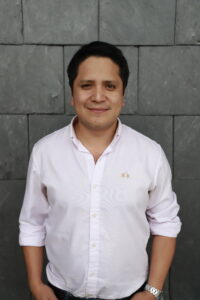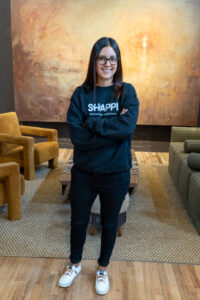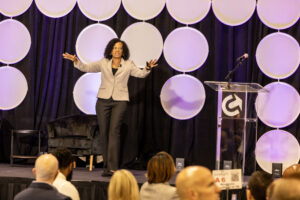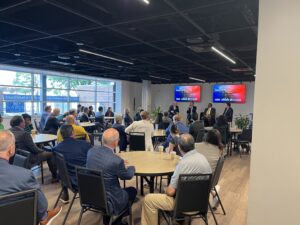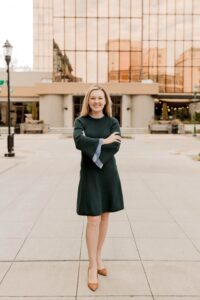Sybil Topel
From New York City to Chattanooga, “Scenic Roots” host Ray Bassett on WUTC has traveled across the country for his journalism career. He has seen a lot in life – from the 9/11 attacks in NYC to producing CBS News legend Charles Osgood on network radio to working for The Associated Press. When it comes to Chattanooga, Ray says it is home. That's why he's passionate about telling inspirational stories about movers and shakers in our community on “Scenic Roots” – weekdays at 3 p.m. on WUTC from the UTC campus – as the program marks one year on the air.
(photo credit above) Taylor Hooper Photography
Trend: How did you come up with the name “Scenic Roots”?
Bassett: Like putting together a puzzle. The title grew out of a blur of brainstorming chats that I had with the show's founding producers: Haley Solomon, Karley Dodson and Will Davis. By then, we had a sense of what we wanted the show to be for our listeners. That compass guided us through trial and error to arrive at “Scenic Roots.”
Trend: How many listeners do you have? What's the difference between commercial and public radio?
Bassett: Numbers I do not have – but our listeners are found here in East Tennessee, Alabama, Georgia and North Carolina. Public radio at its best is a public service that informs, enlightens, elevates and entertains. Whatever its limits and challenges, public radio – especially now – stands worlds apart from the relentless implosion in commercial radio at all levels that I witnessed from the inside throughout my career.
Trend: If someone wanted to pitch you for a news or feature interview, what top 3-5 tips would you give them?
Bassett:
- Be prepared.
- Be brief.
- Know your audience.
- Be flexible.
Trend: One of your early jobs was at The Associated Press, then later you spent more than 10 years working with legend Charles Osgood on The Osgood File, reaching the ears of some 4.5 million people each week during their morning commute. Do you have any great stories from either of those jobs you’d like to share?
Bassett: I happened to be producing The Osgood File at CBS News in New York during the week of 9/11, almost twenty years ago now. The File's longtime producer before me, Phil Chin, had wanted to take a vacation that week and had asked me to fill in. I was in my late 20's, weathering a dot-com bubble layoff at CBS News by taking a patchwork of freelance gigs in the building. The first I heard of what was unfolding on that horrific day came when Charlie walked into our control room after we were already done taping for that morning – and he told me: “A plane just hit the World Trade Center” – about four-and-a-half miles to the south of us in Manhattan. It was just him and me in that moment – and just the two of us in that studio for the rest of that week.
Months later, I landed a fulltime job at AP in its digital division, as the Internet was starting to bite into print and social media was about to be born. Looking back, AP felt like a marathon of “The Office” that I joined and then left while in progress. I spent five-and-a-half years there, before Charlie invited me to return to CBS and produce The File for what would be the final decade of his career.
Trend: Who is the most ‘famous’ person you’ve interviewed – or the one that made the most lasting impression on you and why?
Bassett: The interviews that often touch me the most are the ones with veterans of any era. My grandfather was killed in the Korean War, a few weeks before Christmas 1950 – when my father was less than a year old. His remains are still somewhere over there, north of the 38th Parallel. That war is “forgotten” by many – never by me.
Trend: What do you tell students who are interested in pursuing a career in radio, broadcasting or journalism?
Bassett: It's a craft and a calling. You may have to endure a lot to pursue that craft and fulfill that calling – especially now. For some, it's a first step to another field – not a final destination. For others, there's nothing else quite like it and never will be. Take the craft and the calling seriously – never worship them and never take yourself too seriously. Be ready, be practical and be open as you face whatever the path ahead may hurl at you. Never stop questioning and never stop learning, including from those who came before you – as we before you also learn from you. We are counting on you to become the role models for those who come after you. I know y'all can do it.
Trend: There’s a lot of talk these days about factual reporting versus internet propaganda. What advice do you have for our readers about discerning fact from fiction?
Bassett: Wherever possible, rely on more than one source. Question sources against each other – and challenge yourself – where you can. What's labeled as “news” can get lost in what's really “narrative” – know the difference between them. If what's labeled as “news” claims to do your thinking and feeling for you, maybe it's something other than news.
Trend: How did your degree in political science inform your career?
Bassett: I attended Carleton College, a small private liberal arts college in Southern Minnesota. Its colors are maize and blue, the frequency at the student radio station is 88.1 FM … if that sounds familiar, that's synchronicity for you. My degree taught me that my interest in politics did not spell academia – I remember one of my poli sci professors critiquing a paper I had written with the words: “Too journalistic.” But, the rigor of the degree did prepare me well for larger stages down the road.
Trend: Did you have any mentors or coaches or people you sought out for advice along the way?
Bassett: So many people, so little time. Charlie, of course. Dan and Gail Collins, who are also friends. Countless names between CBS News, AP and the Minnesota State Capitol. Kit Troedson, the radio news director in Minneapolis who helped me land my first job after college, got me to New York and kept me steady all the way to Chattanooga. Pat Cadigan – the radio host in Duluth, Minnesota who Bob Dylan grew up listening to – and he was still on the air at my first job. And on and on and on.
Trend: What drew you to Chattanooga?
Bassett: Osgood retired The File – and from broadcasting – the year after he stepped down as host of Sunday Morning on CBS-TV. I took a sabbatical, then I decided to figure out what was next. I was ready for a change of place and a change of pace. I searched and applied for jobs across the country, mostly in public radio – applying in enough states to win a landslide in the Electoral College – and I got a few hits. When I saw the posting for WUTC, I remembered the story we had done a few years earlier at CBS about Chattanooga going big on the gig. I took a closer look at the city and I saw a few echoes with where I began in radio – the interview went well and here I am.
Trend: What surprised you the most after you moved here from New York City?
Bassett: How right this place felt – how “home” this place felt – from the moment the wheels of the plane that brought me from New York to Chattanooga hit the ground at the airport. As strange as that sounds, that feeling has never left me – and I felt it twice before here: the mountains of Scotland and the mountains of Norway. My great-grandparents on my mother's side came to this country from Norway, so there you go.
Trend: Changing gears completely, how has COVID-19 changed radio operations and student interactions?
Bassett: We had to pause “Scenic Roots” at the end of March – and stay out of the radio station for a few weeks – as part of the university's response to COVID-19. By that point, students at UTC had already shifted to online learning for the rest of the semester. Since we had to pause at WUTC and I had to stay home, I had the chance to set up my home recording equipment from New York in the new apartment I had just bought and moved into here in Southside. We relaunched “Scenic Roots” in mid-April with me working entirely from home and our producers working remotely as well. By the way, my closet provides excellent soundproofing. On that basis alone, I think I made a wise investment in buying a home just in time – and I am very grateful.

